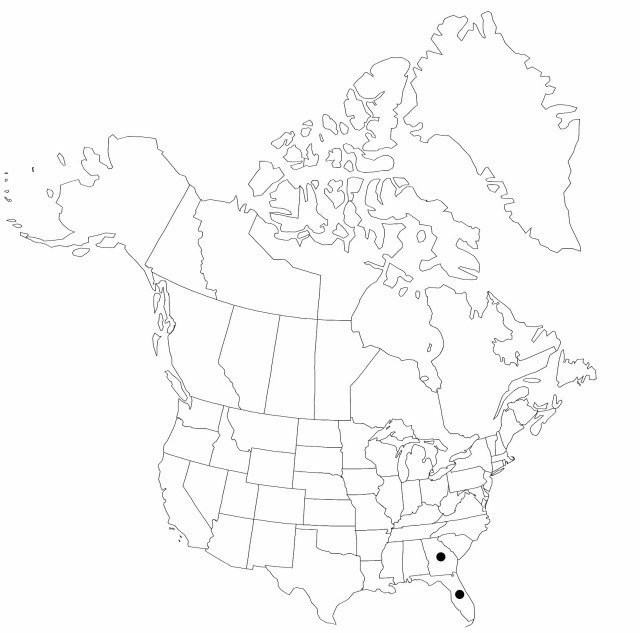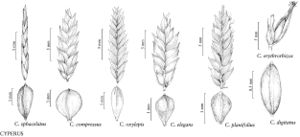Difference between revisions of "Cyperus planifolius"
Actes Soc. Hist. Nat. Paris 1: 106. 1792.
FNA>Volume Importer |
imported>Volume Importer |
||
| (4 intermediate revisions by 2 users not shown) | |||
| Line 6: | Line 6: | ||
|place=1: 106. 1792 | |place=1: 106. 1792 | ||
|year=1792 | |year=1792 | ||
| + | }} | ||
| + | |special_status={{Treatment/ID/Special_status | ||
| + | |code=F | ||
| + | |label=Illustrated | ||
}} | }} | ||
|basionyms= | |basionyms= | ||
| Line 11: | Line 15: | ||
|name=Cyperus brizaeus | |name=Cyperus brizaeus | ||
|authority=Vahl | |authority=Vahl | ||
| + | |rank=species | ||
}} {{Treatment/ID/Synonym | }} {{Treatment/ID/Synonym | ||
|name=Cyperus brunneus | |name=Cyperus brunneus | ||
|authority=Swartz | |authority=Swartz | ||
| + | |rank=species | ||
}} {{Treatment/ID/Synonym | }} {{Treatment/ID/Synonym | ||
|name=Cyperus purpurascens | |name=Cyperus purpurascens | ||
|authority=Vahl | |authority=Vahl | ||
| + | |rank=species | ||
}} | }} | ||
|hierarchy=Cyperaceae;Cyperus;Cyperus subg. Cyperus;Cyperus planifolius | |hierarchy=Cyperaceae;Cyperus;Cyperus subg. Cyperus;Cyperus planifolius | ||
| Line 40: | Line 47: | ||
-->{{#Taxon: | -->{{#Taxon: | ||
name=Cyperus planifolius | name=Cyperus planifolius | ||
| − | |||
|authority=Richard | |authority=Richard | ||
|rank=species | |rank=species | ||
| Line 54: | Line 60: | ||
|publication title=Actes Soc. Hist. Nat. Paris | |publication title=Actes Soc. Hist. Nat. Paris | ||
|publication year=1792 | |publication year=1792 | ||
| − | |special status= | + | |special status=Illustrated |
| − | |source xml=https:// | + | |source xml=https://bitbucket.org/aafc-mbb/fna-data-curation/src/2e0870ddd59836b60bcf96646a41e87ea5a5943a/coarse_grained_fna_xml/V23/V23_284.xml |
|genus=Cyperus | |genus=Cyperus | ||
|subgenus=Cyperus subg. Cyperus | |subgenus=Cyperus subg. Cyperus | ||
Latest revision as of 20:39, 5 November 2020
Herb, perennial, cespitose, rhizomatous. Culms trigonous, 25–50(–80) cm × 0.8–2.6 mm, glabrous. Leaves flat to V-shaped, 30–80 cm × 3–10 mm. Inflorescences: spikes ovoid, 1.5–3 × 1.5–3 cm; rays 4–7, 1–10 cm; 2d order rays occasionally present, 0.5–2 cm, rays often not elongate, inflorescence then capitate, 2–5 cm diam.; bracts 4–8, horizontal to ascending at 30°, flat to V-shaped, longest 6–35 cm × (1.5–)4–8 mm; rachilla persistent, wings 0.4–0.6 mm wide. Spikelets (10–)20–60, reddish brown, flattened elliptic in cross section, linear-lanceoloid, 6–22 cm × (1–)2–3(–4) mm; floral scales deciduous, 6–16, medially greenish, laterally reddish brown to brown, medially 3–5-ribbed, laterally 3–5-ribbed, ovate-lanceolate to ± orbiculate, 2.5–3 × 1.4–1.8 mm, apex acute to obtuse and mucronulate. Flowers: anthers 0.7–1.8 mm; styles (0.3–)1.2–2.8 cm; stigmas (1–)2–3 mm. Achenes brownish to black, stipitate or sessile, ellipsoid to obovoid or oblong, 1.3–2 × 0.75–1(–1.1) mm, apex obtuse, apiculate or not, surfaces coarsely punctate.
Phenology: Fruiting throughout the year.
Habitat: Coral sand beaches, coastal rock outcrops
Elevation: 0–10 m
Distribution

Fla., Ga., Mexico, West Indies, Central America (Belize, Honduras).
Discussion
Selected References
None.
